The Amarasekare Lab
UCLA Department of Ecology and Evolutionary Biology
People
Principal Investigator
Priyanga Amarasekare
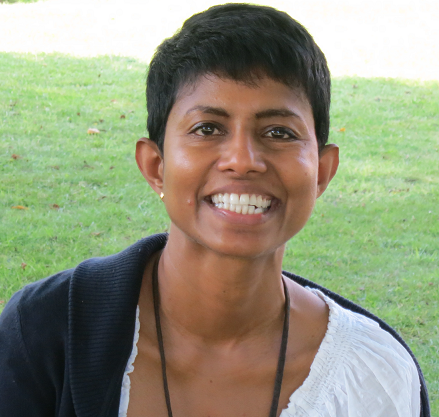 My research focuses on how the interplay between abiotic environmental variation and biotic interactions influences ecological and evolutionary dynamics. It seeks to explain patterns of dynamics and diversity that are observed in nature, and to predict how such patterns may change under perturbations to the abiotic and biotic environment. My approach is a combination of observation, experimentation and mathematical modelling. Through investigations of species' responses to perturbations in the abiotic and biotic environments, my research spans both basic and applied issues in Evolutionary ecology.
My research focuses on how the interplay between abiotic environmental variation and biotic interactions influences ecological and evolutionary dynamics. It seeks to explain patterns of dynamics and diversity that are observed in nature, and to predict how such patterns may change under perturbations to the abiotic and biotic environment. My approach is a combination of observation, experimentation and mathematical modelling. Through investigations of species' responses to perturbations in the abiotic and biotic environments, my research spans both basic and applied issues in Evolutionary ecology.
Post Docs
Katie Scranton
 I am a quantitative ecologist focusing on the mechanisms by which individual level variation translates into population level patterns. (personal website: www.katherinescranton.com)
I am a quantitative ecologist focusing on the mechanisms by which individual level variation translates into population level patterns. (personal website: www.katherinescranton.com)
Robert McElderry
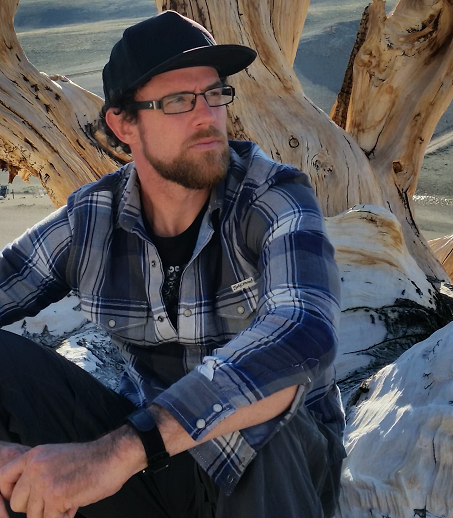 I am a population biologist especially interested in the conservation biology and evolutionary ecology of endemic species. My research addresses how, why and when some species are successful (or not) in particular unique environments. I use a variety of field, laboratory, statistical, and modeling approaches to determine which biotic and abiotic factors are key to the success of individuals at different points in their life cycle and how factors acting at different phases in the life cycle affect overall success. I am interested in applications to management of endangered species. (personal website: http://robertmcelderry.wixsite.com/research)
I am a population biologist especially interested in the conservation biology and evolutionary ecology of endemic species. My research addresses how, why and when some species are successful (or not) in particular unique environments. I use a variety of field, laboratory, statistical, and modeling approaches to determine which biotic and abiotic factors are key to the success of individuals at different points in their life cycle and how factors acting at different phases in the life cycle affect overall success. I am interested in applications to management of endangered species. (personal website: http://robertmcelderry.wixsite.com/research)
As a postdoc in the Amarasekare lab I am part of a team of postdocs, graduate and undergraduate students working together to link experimental data with mathematical models and further eco-evolutionary theory. My role is to oversee the experimental side of this work using a culture of Harlequin bugs and the two parasitoid wasps that attack Harlequin eggs. Through student led projects, we are currently investigating correlations between mating behaviors, size, coloration, age, and lifetime reproductive success. While revealing biological aspects of our study organisms, these projects also contribute to our collective goal to elucidate how temperature effects that operate at the individual level translate to population and community level processes, and how these ecological processes feed back into trait responses, causing trait evolution. Using a quantitative genetic approach, we record complete life histories for full sibling families divided among temperature treatments. With these data we are linking individual level traits to population fitness to measure selection gradients, and by linking fitness to genetic and phenotypic variation we can evaluate the potential for trait evolution.
Graduate Students
Margaret Simon
 I am interested in understanding the behavior of complex natural systems from a dynamical modeling perspective. I focus on uncovering the mechanisms that underlie spatial and temporal patterns emerging at the level of the population and community. My dissertation work integrates theory and data to examine how temperature, and its variation in time, affect the success of introduced ectotherm invasions via abiotic filtering and temperature-dependent biotic resistance (i.e., competitive interactions with native populations).
I am interested in understanding the behavior of complex natural systems from a dynamical modeling perspective. I focus on uncovering the mechanisms that underlie spatial and temporal patterns emerging at the level of the population and community. My dissertation work integrates theory and data to examine how temperature, and its variation in time, affect the success of introduced ectotherm invasions via abiotic filtering and temperature-dependent biotic resistance (i.e., competitive interactions with native populations).
Guilherme Casas Gonçalves
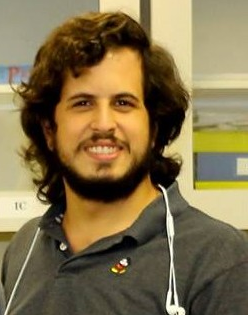 My research interests center on population dynamics and community ecology. I am particularly interested in developing mathematical models to understand how population persistence and biodiversity maintenance is affected by variable environments and how these ecological dynamics influence trait evolution. For my Ph.D. I plan to develop a mathematical framework for integrating stage-structured population models (developed using delay differential equations with time-dependent developmental delays) with quantitative genetic/adaptive dynamics models of reaction norm evolution. I hope to use this framework to investigate how species adapt to rapid environmental changes such as climate change.
My research interests center on population dynamics and community ecology. I am particularly interested in developing mathematical models to understand how population persistence and biodiversity maintenance is affected by variable environments and how these ecological dynamics influence trait evolution. For my Ph.D. I plan to develop a mathematical framework for integrating stage-structured population models (developed using delay differential equations with time-dependent developmental delays) with quantitative genetic/adaptive dynamics models of reaction norm evolution. I hope to use this framework to investigate how species adapt to rapid environmental changes such as climate change.
Undergraduate Students
Daniel Smith
 I am a theoretical ecologist interested in the effect of temperature on community dynamics. In particular, I am interested in how seasonal temperature variation may be source of environmental heterogeneity that leads to species coexistence. In Dr. Amarasekare'
s lab, I constructed a Lotka-Volterra type model that depicts how seasonality may allow for coexistence between two ectotherms competing for the same resource species. Currently, I am conducting research on how thermal reaction norms vary as a function of latitude.
I am a theoretical ecologist interested in the effect of temperature on community dynamics. In particular, I am interested in how seasonal temperature variation may be source of environmental heterogeneity that leads to species coexistence. In Dr. Amarasekare'
s lab, I constructed a Lotka-Volterra type model that depicts how seasonality may allow for coexistence between two ectotherms competing for the same resource species. Currently, I am conducting research on how thermal reaction norms vary as a function of latitude.
Jason Pan
 I am interested in the ecology and evolution of infectious diseases, with special emphasis on vector-borne diseases. My research project focuses on developing a trait-based mathematical framework for elucidating the temperature dependence of the basic reproductive rate (R0) of vector-borne diseases such as Malaria, Zika and Dengue. I am working with Dr. Amarasekare to derive an analytical expression for R0 based on its components (e.g., transmission and recovery rates) and to determine how the temperature responses of the components drive the temperature dependence of R0.
I am interested in the ecology and evolution of infectious diseases, with special emphasis on vector-borne diseases. My research project focuses on developing a trait-based mathematical framework for elucidating the temperature dependence of the basic reproductive rate (R0) of vector-borne diseases such as Malaria, Zika and Dengue. I am working with Dr. Amarasekare to derive an analytical expression for R0 based on its components (e.g., transmission and recovery rates) and to determine how the temperature responses of the components drive the temperature dependence of R0.
Katherine Zhou
 I am an undergraduate Honors student in the Amarasekare lab. I am studying the effects of coloration and body size on the mating behavior of the harlequin bug (Murganita histrionica). I am particularly interested in the influence of color and size in mate choice and duration of copulation and am collecting data on lifetime reproductive success to determine the relative fitness advantages of mate choice based on size vs. color.
I am an undergraduate Honors student in the Amarasekare lab. I am studying the effects of coloration and body size on the mating behavior of the harlequin bug (Murganita histrionica). I am particularly interested in the influence of color and size in mate choice and duration of copulation and am collecting data on lifetime reproductive success to determine the relative fitness advantages of mate choice based on size vs. color.
Li Li
 I am an undergraduate Honors student in the Amarasekare lab. My research focuses on the allocation of time to resource acquisition and reproductive success of Harlequin bugs (Murgantia histrionica). I am investigating the optimal balance between time resources and reproductive output in a laboratory culture of harlequin bugs. Harlequin bugs spend a considerable amount of time copulating, during which females receive resources necessary for egg production, so we usd copulation time to measure resource acquisition time. And, currently, I am using an agent-based model (modeling behavior probabilistically for each bug) to further explore the relationship among copulations, reproductive success, and fitness. Our laboratory experiments contribute to studies of foraging strategies and behavioral ecology by offering insight into a decision process that is difficult to observe in the field, and links this behavior to reproductive success.
I am an undergraduate Honors student in the Amarasekare lab. My research focuses on the allocation of time to resource acquisition and reproductive success of Harlequin bugs (Murgantia histrionica). I am investigating the optimal balance between time resources and reproductive output in a laboratory culture of harlequin bugs. Harlequin bugs spend a considerable amount of time copulating, during which females receive resources necessary for egg production, so we usd copulation time to measure resource acquisition time. And, currently, I am using an agent-based model (modeling behavior probabilistically for each bug) to further explore the relationship among copulations, reproductive success, and fitness. Our laboratory experiments contribute to studies of foraging strategies and behavioral ecology by offering insight into a decision process that is difficult to observe in the field, and links this behavior to reproductive success.
Graduate Lab Alumni
Kenichi Okamoto
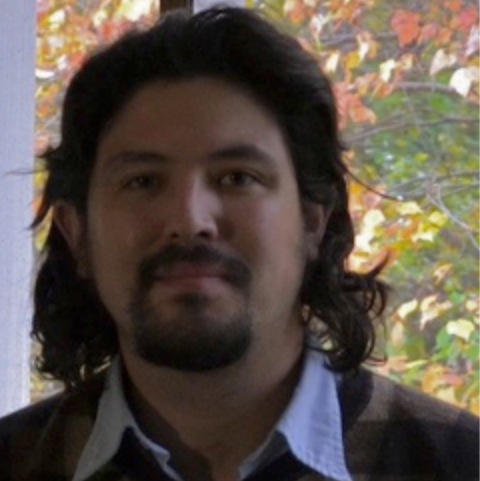 I am an evolutionary ecologist. My goal is to link theory and data in order to understand how community structure drives trait evolution, and elucidate how evolutionary change, in turn, feeds back to structure multi-species communities. I received my Ph.D. in Biology from the University of California, Los Angeles. Since January of 2015, I have been based at the Yale Institute for Biospheric Studies (YIBS) and the Department of Ecology and Evolutionary Biology at Yale University working with the Post, Turner and Vasseur groups. I also work in close collaboration with the Grether group at UCLA to pioneer the emerging field of agonistic character displacement. (personal website: www.kewok.github.io)
I am an evolutionary ecologist. My goal is to link theory and data in order to understand how community structure drives trait evolution, and elucidate how evolutionary change, in turn, feeds back to structure multi-species communities. I received my Ph.D. in Biology from the University of California, Los Angeles. Since January of 2015, I have been based at the Yale Institute for Biospheric Studies (YIBS) and the Department of Ecology and Evolutionary Biology at Yale University working with the Post, Turner and Vasseur groups. I also work in close collaboration with the Grether group at UCLA to pioneer the emerging field of agonistic character displacement. (personal website: www.kewok.github.io)
Christopher Johnson
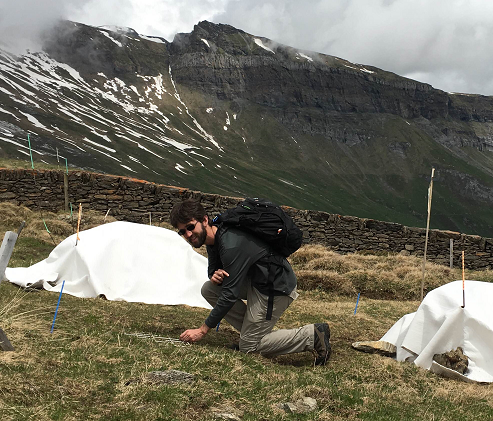 I am currently a Postdoctoral Fellow at the Center for Adaptations to a Changing Environment (ACE) at the Swiss Federal Institute of Technology (ETH) Zürich in collaboration with Dr. Jonathan Levine and the Plant Ecology Group. Previously, I was a SFAz Bisgrove Postdoctoral Fellow at the University of Arizona in collaboration with Dr. Judith Bronstein and Dr. Régis Ferriére. I completed my Ph.D. in 2013 under the supervision of Dr. Priyanga Amarasekare at the University of California Los Angeles.
(personal website johnsonecology.weebly.com)
I am currently a Postdoctoral Fellow at the Center for Adaptations to a Changing Environment (ACE) at the Swiss Federal Institute of Technology (ETH) Zürich in collaboration with Dr. Jonathan Levine and the Plant Ecology Group. Previously, I was a SFAz Bisgrove Postdoctoral Fellow at the University of Arizona in collaboration with Dr. Judith Bronstein and Dr. Régis Ferriére. I completed my Ph.D. in 2013 under the supervision of Dr. Priyanga Amarasekare at the University of California Los Angeles.
(personal website johnsonecology.weebly.com)
Undergraduate Honors Student Lab Alumni
David Kidd
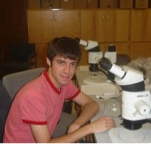
David received a B.S. in Biology from UCLA in 2012. For his Honors research project he conduced experiments on quantifying the functional responses of the two parasitoid species of the harlequin bug, with the aim of determining whether species-specific responses in the non-linearity of functional responses could contribute to parasitoid coexistence. David's paper on this project was published in the Journal of Animal Ecology in 2012 and was the subject of an In Focus article. While a student in the Amarasekare lab David won the Undergraduate Research Prize in Ecology and Evolution in 2011 and was a recipient of the Whitcome Summer Fellowship in the same year. David received his medical training from Johns Hopkins University and is currently doing his residency at Johns Hopkins.
Michelle Ding
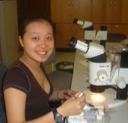 Michelle's Honors research involved investigating temperature effects on parasitoid searching behavior. She received a B.S. in Biology from UCLA and is attending Pharmacy School at the University of southern California.
Michelle's Honors research involved investigating temperature effects on parasitoid searching behavior. She received a B.S. in Biology from UCLA and is attending Pharmacy School at the University of southern California.
Martin Sahakyan
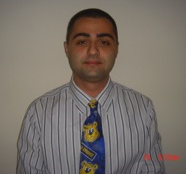 Martin received a B.S. in Biology from UCLA in 2012. He conducted Honors research on temperature effects on the fecundity and adult survival of the harlequin bug. Martin, along with Romina Sifuentes, received the Undergraduate Research Prize in Ecology and Evolution in 2010.
Martin received a B.S. in Biology from UCLA in 2012. He conducted Honors research on temperature effects on the fecundity and adult survival of the harlequin bug. Martin, along with Romina Sifuentes, received the Undergraduate Research Prize in Ecology and Evolution in 2010.
Rikhi Rishi
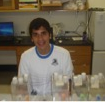 Rishi conducted his Honors research project on competitive interactions between the two parasitoids of the harlequin bug. He received his B.S. in Biology in 2012 and is currently at the University of Miami medical school.
Rishi conducted his Honors research project on competitive interactions between the two parasitoids of the harlequin bug. He received his B.S. in Biology in 2012 and is currently at the University of Miami medical school.
Romina Sifuentes
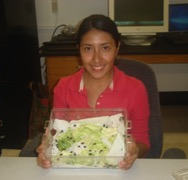 Romina received a B.S. in Biology from UCLA in 2012. She conducted Honors research on the effects of temperature on the development and survivorship of the harlequin bug. A paper based on her research was published in Functional Ecology in 2012. Romina, along with Martin Sahakyan (see below) received the Undergraduate Research Prize in Ecology and Evolution in 2010.
Romina received a B.S. in Biology from UCLA in 2012. She conducted Honors research on the effects of temperature on the development and survivorship of the harlequin bug. A paper based on her research was published in Functional Ecology in 2012. Romina, along with Martin Sahakyan (see below) received the Undergraduate Research Prize in Ecology and Evolution in 2010.
Clara Woodie
 I received a B.S. in Biology from UCLA. I started in the Amarasekare lab as an Honors research student investigating the reproductive success of two insects parasitoids that attack the harlequin bug, a specialist herbivore on Isomeris arborea, an endemic plant species of the California coastal sage scrub community. In my current position I am involved in a running a large-scale experiment that quantifies the thermal reaction norms for fecundity, development and survivorship in the harlequin bug and its parasitoids.
I received a B.S. in Biology from UCLA. I started in the Amarasekare lab as an Honors research student investigating the reproductive success of two insects parasitoids that attack the harlequin bug, a specialist herbivore on Isomeris arborea, an endemic plant species of the California coastal sage scrub community. In my current position I am involved in a running a large-scale experiment that quantifies the thermal reaction norms for fecundity, development and survivorship in the harlequin bug and its parasitoids.
Sandra de Mel
Sandra received a B.S. in Biology from UCLA in 2013. She conducted an Honors research project on the effects of temperature on the two parasitoid species' functional responses, for which she was awarded the Whitcome Summer Fellowship in 2013.
Suzanne Felipe
Suzanne's Honors research project involved experiments on the effects of resource competition on the development and fecundity of the harlequin bug. Suzanne is currently completing her Ph.D. in Education at Stanford University.
Eric Sumner
Eric received a B.S. in Biology from UCLA in 2013. His Honors thesis project involved investigating the effects of spatial heterogeneity on interference competition between the two parasitoids of the harlequin bug. Eric is currently studying for his Medical degree at the University of Nevada.
Christine Hsu
Christine's Honors research involved conducting experiments on quantifying the thermal reaction norms of the harlequin bug. She received a B.S. in Biology from UCLA in 2012.